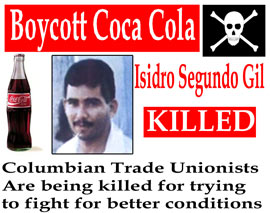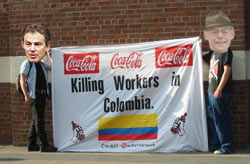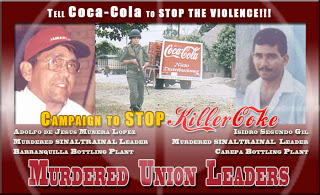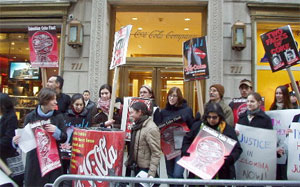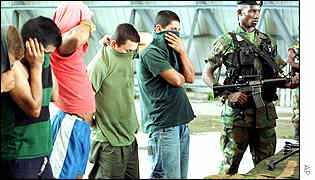 |
| Right-wing paramilitaries under arrest in Colombia |
Colombia is an ideal US style democracy. The US, in the name of the ‘war against drugs’ armed and equipped the regime’s death squads, allegedly to fight the guerillas but in fact to do the dirty work of US multi-nationals like Coca Cola.
Cuba, which has no death squads, is subject to vicious US sanctions. All in the name of ‘democracy’. By way of contrast Colombia, like El Salvador, Honduras and Guatemala before it were recipients of large amounts of US military aid. Why? Because US foreign policy is solely concerned with the operation of US corporations like Coke, who want the cheapest labour possible.
There are still some fools on the left who believe the US has good intentions. They even believe the US says what it means about democracy in Syria and Libya before it. But for 60 years, since the overthrow of the democratic regime of Arbenz in Guatemala (the same year that Mossadegh, the popularly elected Prime Minister of Iran was removed in a coup) the US has turned South American into a veritable maze of torture chamber states. Between 1976 and 1983 the Argentinian generals, neo-Nazi to the core (they murdered 3,000 young ‘Marxist’ Jews while Israel supplied the regime with weapons) were part of the US plans to eradicate ‘communism’. Argentina was part of Operation Condor.
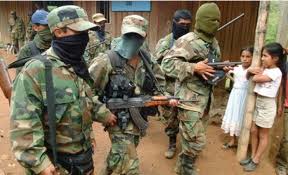 |
| Death Squads |
Chile under Pinochet (Thatcher’s good friend, whom she will no doubt join when she eventually dies of the senile dementia that has been her reward for a lifetime of reaction) in 1973 had begun the fightback against democracy when the Marxist President Salvador Allende was murdered and thousands murdered and tortured. DINA, the secret police, even assassinated a political opponent in Washington DC where terrorism of the Right was covered up. The former chief of the Army, Carlos Prats was murdered by DINA in Argentina in a similar terrorist attack. But this was the kind of terrorism that the US approved of and so nothing was said. No sanctions here as millions were kept below the starvation line in order to line the pockets of US corporations. Likewise, when the dictator Somoza of Nicaragua died the US suddenly became interested in ‘democracy’ sponsoring the terrorist Contras. But Cuba, which has one of the world’s best health services (& a lower child mortality rate than the US) was pilloried and sanctioned. All in the name of freedom.
Read below the shocking story of how the regime is preparing to send trade union leaders to their deaths for the same of Coke. And as the story makes clear, international pressure has been very important in staying the hand of the murderers.
Tony Greenstein
Can Three Assassins Get a Government to do Their Dirty Deeds?
By Fred Hirsch ([email protected])
The Colombian government is preparing to throw two union leaders to the mercy of paramilitary terrorists on the testimony of three murderers.
William Mendoza is President of the Food and Beverage Workers Union (Sinaltrainal) in Barrancabermeja, Santander in north central Colombia. Juan Carlos Galvis is on the union’s National Executive Board and President of the Santander branch of the CUT, the nation’s’ main labor federation. I met them both when I was sent to Colombia by my local Union, Plumbers and Fitters Union, Local 393, on a labor delegation inquiring into the violence against trade unionists in 2002. Colombia is internationally recognized as the most lethal nation in the world for trade unionists. More unionists are killed there than anywhere else in the world.
William and Juan Carlos both live and work in Barrancabermeja, the location of the largest oil refinery in Colombia, on the shore of the Magdalena River. Barranca, as the city is commonly called, is visibly under the authority of the Army, Navy and local police. The locals, however recognize that the paramiltary death squads have firm political control. Juan Carlos has stated, “The Paras do whatever they want here in Barranca…They have the political power. They have the economic power.” It is essentially, he says, “a totalitarian agenda.” William defines the totalitarian agenda as “A regime in which the common denominator will be terror, hunger and misery for the people so that the rich can become even richer.”
Both Juan Carlos and William represent the workers in Barranca’s Coca Cola plant. They have been targeted with death threats since 2001. They, and others like them are labeled “subversives” by the paramilitaries, linked falsely to the guerilla movement, and are labeled “military targets.” William told me that the violence against Sinaltrainal is based in Coke’s determination to force the union out of its bottling plants: “They want to impose casual labor, part-time labor, and drive down our wages and working conditions.”
During the last 30 years the union and its activist members have lived in a pervading climate of terror. Paramilitary terrorism seems to peak at contract time. Three Sinaltrainal leaders have been assassinated in Colombia precisely when contracts have come up for negotiations. Over time, 25 Sinaltrainal leaders have been killed, 2 have been “disappeared,” 14 imprisoned, and 6 forced to leave the country. Many others and their family members have been attacked and threatened with death. The perpetrators have had total impunity from the law even though some have even confessed to their crimes. Thanks to political pressure brought by the labor movement and human rights organizations in Colombia and abroad, following a government study, Juan Carlos and William are now accompanied 24 hours a day by government supplied bodyguards. For more reliable security, they keep in constant contact with the Union and the local human rights organizations with both a walkie talkies and cell phones.
Sinaltrainal leaders and activists are not the only victims in Barranca. The Oil Workers Union (USO), various human rights groups and the militant women’s organization (OFP) suffer the same intimidation. According to William, this violence is done “by paramilitary forces that accuse us of being an obstacle to investment and development.” It is no secret that the paramilitaries are supported through the drug trade, by large landowners, and by the official military, which has received billions in U.S. aid. A U.S. Embassy spokesman gave our visiting delegation that same description when we had an audience with them in Bogota in 2002. Proving the paramilitary connection with a multinational corporation in a U.S. Court is more difficult.
The United Steelworkers of America (USW) brought suit against Coca Cola in Florida on behalf of Sinaltrainal and its victimized members in Colombian bottling plants. The USW charged that Coke bottlers “contracted with or otherwise directed paramilitary security forces that utilize extreme violence and murdered, tortured, unlawfully detained or otherwise silenced trade union leaders,” They presented substantial and credible evidence, but the decision failed to nail the company on the technicality of a claimed separation between the Atlanta based Coca Cola Company and Panamco, its subsidiary in Colombia.
Juan Carlos was party to the law suit. He said, “If we lose this fight against Coke, first we will lose our union, next we will lose our jobs, and then we will all lose our lives!”
For Juan Carlos, who survived an assassination attempt, the worst and most dangerous outrage was last November when two “paras” broke into his home. One pointed a gun at his daughter and said they’d kill the girl if his wife screamed. They demanded information about him from his wife, Jackeline, then bound and gagged her and sprayed her face, hair and clothing with red paint. The intruders wrote threats on the walls, and made off with two computers and memory drives.
William’s young daughter has received phone threats against her father from men who watch the house and track her going and coming to and from school. Some years ago his four year old daughter was snatched by two men in broad daylight in a public park in Barranca. His wife ran after them, drew attention with a great commotion, and was able to take hold of the little girl and thwart the attempted kidnapping. Later that day William received a phone call from a paramilitary leader who said they did not intend to keep the little girl, but to return her “in a plastic bag.”
Today William and Juan Carlos are alleged to have taken part in placing a bomb in a Coca Cola plant in 1998. The charge was leveled in 2008 and is only now being activated. Up until this spring the Colombian government, anxious to complete the U.S./Colombia Free trade Agreement, was eager to play down violence against the labor movement. William says “Now that they’ve finalized the Free Trade Agreement they want to finish off Sinaltrainal.”
Their accusers are three paramilitary leaders whose death squads were supposedly demobilized in 2006 in return for telling their story in “free testimony” for which they received varying degrees of amnesty under the 2005 “Justice and Peace” Law 975.
The three accusers are: Rodrigo Perez Alzate, Wilfred Martinez Giraldo, and Saul Rincon. Perez Alzate, alias “Julian Bolivar,” has confessed to 45 murders. He led the paramilitary “Central Bolivar Bloc” of the Magdalena Medio area, which is accountable for 20,868 victims. Martinez Giraldo, alias “Gavilan,” under Perez Alzate’s command, was in charge of the paramilitaries in Barranca. The third accuser. Saul Rincon, alias “Coca Cola,” reported to Gavilan.
Rincon worked as a guard in the Barranca Coke bottling plant . He was active in Sinaltrainal until 1995 when, contrary to union policy, he accepted Coke’s “voluntary retirement” plan, a company scheme to buy out union employees and replace them with non-union contract workers. Rincon quit all contact with the union and later joined the paramilitaries. He is now in prison for the assassination of Rafael Jaimes Torra, Treasurer of the Oil Workers Union.
Over a year ago Saul Rincon called the union from prison demanding a visit from a member of the Executive Board. He threatened that if he didn’t get the visit, William Mendoza and Juan Carlos Galvis would be denounced by former guerillas. It seemed then that a frame up was in the making.
William told me that, “The government now wants to use the judicial process against Juan Carlos and me. They want to send us to prison where we will be assassinated, and in that way, they would strike a blow against Sinaltrainal….The charges are obviously false. They couldn’t kill us so they are trying to frame us…We can’t expect anything good to come of Colombia’s so called justice. We have eight witnesses who know the situation. We hope their testimony will clear up the matter, but nothing is easy here. There is no justice.
“Juan Carlos and I live in Barrancabermeja with our families. We have had health problems due to the stress of this situation. We are suffering severe fatigue and the doctor tells us that continuing with these levels of stress will give us heart attacks.”
“It is tough,” says Juan Carlos, “We are on the brink of death, but we keep surviving. We bring in new members to the union, but the company fires them. If it weren’t for international solidarity, we would have been eliminated long ago. That is the truth.”
William says, “The judicial system in Colombia is now making its decisions based on politics, not the law.” In a recent letter, he writes, “We need you to send letters from members of Congress and from North American organizations protesting this prosecution against Juan Carlos Galvis and me.” They need us, in William’s words, “to continue the political pressure on the Colombian government. That is the deciding factor…”
William Mendoza and Juan Carlos Galvis are working to save their own lives, but the fight to save their union and affirm the right of workers to organize is the passion that has driven them to this point. They clearly understand their contradictory predicament: that the harder they fight for workers’ rights, the more they endanger their very lives – yet they fight.
In fighting for their own lives they fight for, as William put it, “to ensure that the collective bargaining agreements that are signed, particularly with multinational corporations, give a bit more of a share to the working people of Colombia.” Is that asking too much? Coca Cola and the paramilitaries who, according to the USW lawsuit, “contracted with or otherwise direct” do think it’s too much – way too much. They make it worth the life of these two fine union brothers in Barrancabermeja, Colombia.
I was with William the day that he spoke the above words to a Longshore and Warehouse Union (ILWU) convention in San Francisco. The slogan of the ILWU is “An injury to one is an injury to all!” The delegates gave William a standing ovation and made an Honorary Member after he spoke that day. ILWU members understand that to fight for the rights of workers in Colombia is to fight for the rights of all workers. For Juan Carlos and William the stakes are high, their lives. That’s what its all about. Without our help these men are likely to be placed behind prison walls where they will be killed. These men are our brothers. They shall not die!
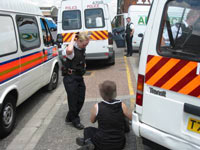 |
| Protest in London |
Please send your own message asking that the government of Colombia stop this blatantly political trial that will take the lives of William Mendoza and Juan Carlos Galvis. Bring the issue to your organization to send a message. Contact your member of Congress and ask them to do the same. Emails may not work. Postage for a regular letter to Colombia is only 98 cents. Faxes are very reliable. Please do it.
WHAT YOU CAN DO
Faxes and letters In English or Spanish should be sent specifically to:
Unidad Nacional de Fiscalía Contra el Terrorismo, Despacho 28, Estructura de Apoyo—Parapolítica A la Diagonal 22 B No. 52-01, Edificio F, Piso 2 Bogotá, D.C., Colombia
FAX: 001 57 1 383 1410 PHONE: 001 57 091 570 2000
If at all possible, Faxes, Letters or Emails should also be sent to the following: (NOTE—For those sending emails, you can copy and paste in the following emails as a group) [email protected], [email protected], [email protected], [email protected], [email protected], [email protected], [email protected], [email protected], [email protected], [email protected], [email protected], [email protected]
JUAN MANUEL SANTOS CALDERÓN
Presidente de la República de Colombia
Carrera 8 No. 7 -26 Palacio de Nariño Bogotá
Fax: (+57 1) 566.20.71
E-mail: [email protected]
ANGELINO GARZÓN
Vicepresidente de la República de Colombia
Carrera 8 No.7-57 Bogotá D.C.
Teléfonos (57 1) 444 2120 – 444 2122
Fax: (57 1) 596 0651
E-mail: [email protected]
Twitter: @angelino_garzon
Fiscalía General de la Nación
Diagonal 22B No. 52-01 – Bogotá, D.C.
Teléfonos: 570 20 00 – 414 90 00
[email protected], [email protected]
RUTH CORREA
Ministra de Justicia y del Derecho de Colombia
Carrera 9a. No. 14-10 – Bogotá, D.C.
e-mail: [email protected], [email protected]>
PBX (+57) 444 31 00 Ext. 1820
ALEJANDRO ORDOÑEZ MALDONADO
Procurador General de la Nación
Fax: (+571) 3429723 – 2847949 Fax: (+571) 3429723
Carrera 5 #. 15-80 – Bogotá, D.C., Colombia
E-mail: [email protected], [email protected] ; [email protected]
WOLMAR ANTONIO PÉREZ ORTIZ
Defensor Nacional del Pueblo
Fax: (+571) 640.04.91
Calle 55 # 10-32, Bogotá.
E-mail: [email protected] ; [email protected]
OFICINA EN COLOMBIA DEL ALTO COMISIONADO DE
NACIONES UNIDAS PARA LOS DERECHOS HUMANOS
Calle 114 No. 9-45 Torre B Oficina 1101
Edificio Teleport Bussines Park – Bogotá, Colombia
Teléfono PBX (57-1) 629 3636 (57-1) 629 3636 Fax (57-1) 629 3637
E-mail: [email protected]
Ambassador P. Michael Mckinley
The United States Embassy Bogota Calle 24 Bis No. 48-50 Bogotá, D.C. Colombia. Mailing address: Carrera 45 No. 24B-27 Bogotá, D.C.
Email [email protected]
See also Coca-Cola Accused of Using Death Squads to Target Union Leaders
